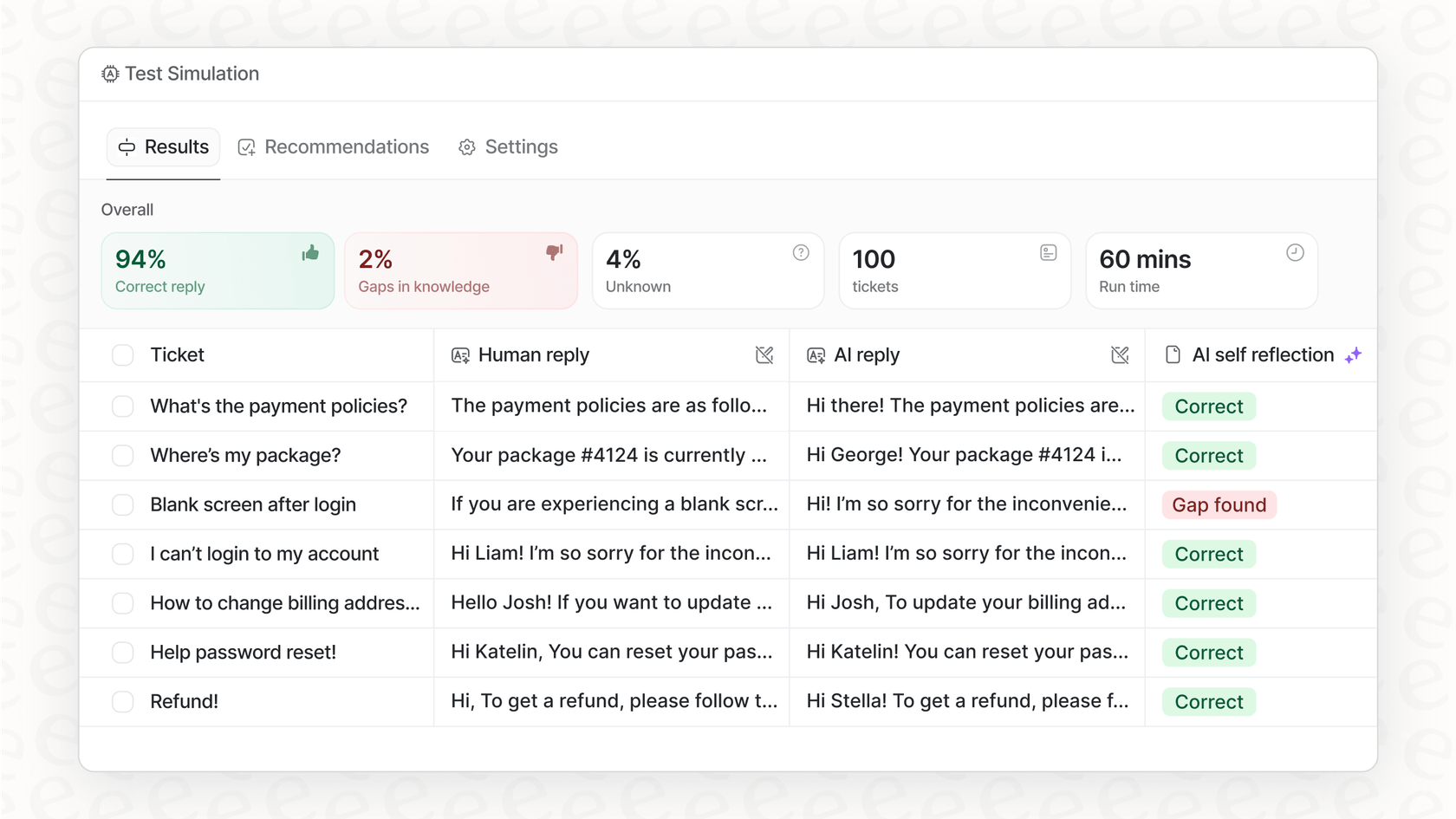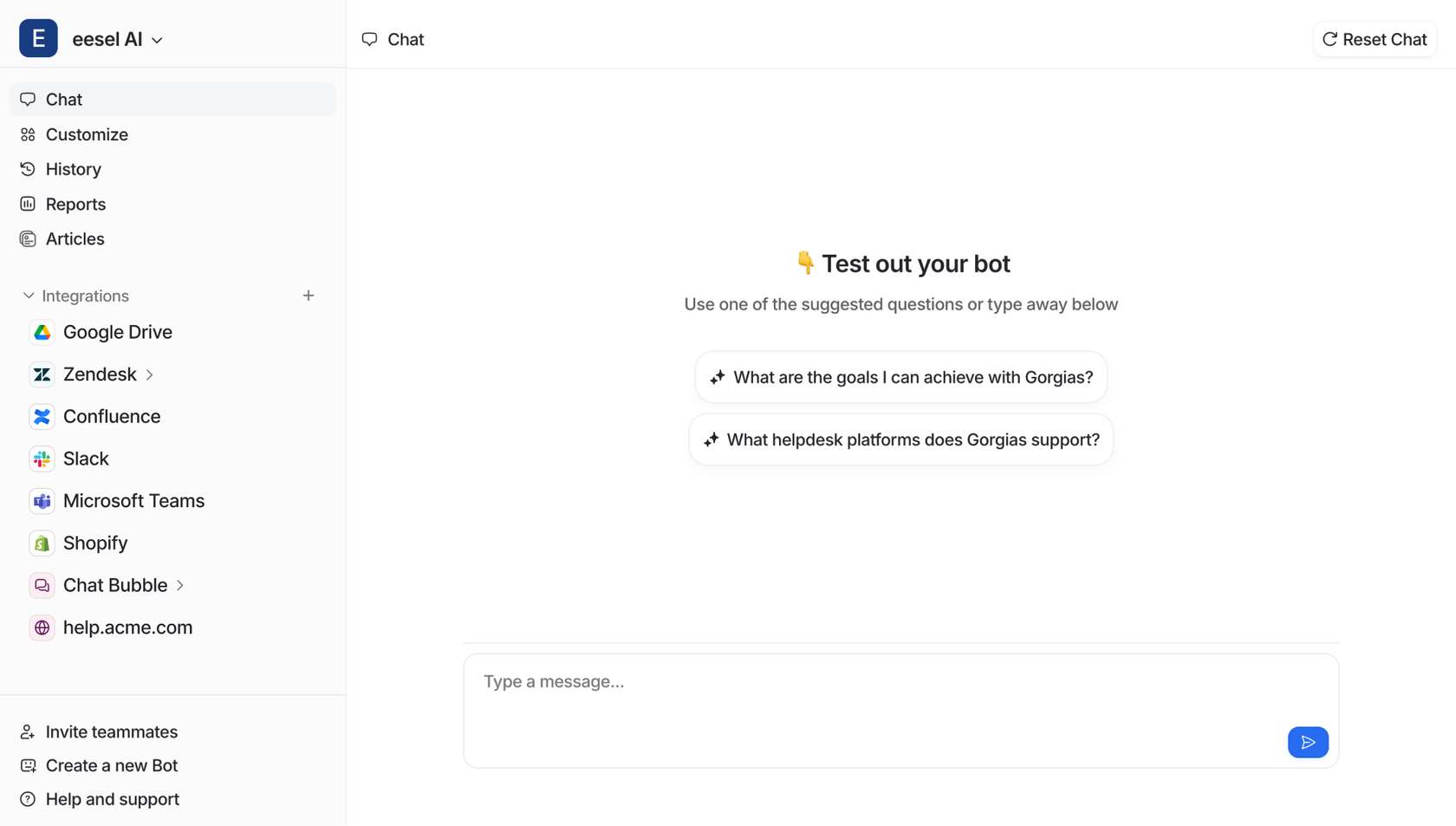5 best Macha AI alternatives for Zendesk & Shopify in 2025

Kenneth Pangan
Last edited September 24, 2025

So, you’re looking into AI copilots like Macha AI for your support team. It seems like the obvious next step, right? But then reality hits. You find yourself tangled in a complicated setup, getting frustrated by the lack of integrations, or looking at a price tag that seems intentionally confusing.
Finding the right tool really shouldn’t be that difficult. You need an AI assistant that actually helps your team, not one that requires months of onboarding or makes you rip out your entire helpdesk just to get started.
That’s why I put this guide together. It skips the fluff and gets straight to what matters. I’ve personally gone through the 5 best Macha AI alternatives, focusing on the practical stuff that solves real support problems, like instantly connecting to all your team’s knowledge and giving you full control over what gets automated.
Understanding Macha AI alternatives: What is an AI support copilot?
First things first, an AI support copilot is way more than the simple chatbots you see popping up on most websites. Think of it as a smart assistant that works right alongside your support team, inside the helpdesk they already use every day.
Its main job is to make your agents faster, smarter, and more consistent. Here’s how:
-
It drafts accurate, on-brand replies using your company’s actual knowledge.
-
It handles the boring, repetitive tasks like tagging, categorizing, or routing tickets.
-
It finds the right answer in seconds, even if that answer is buried in a dusty Confluence page, an old support ticket, or one of a dozen different Google Docs.
The goal here isn’t to replace your human agents. It’s to free them up. By taking care of the routine questions, a good copilot lets your team focus on the tricky issues where a human touch really makes a difference.
How I picked the best Macha AI alternatives
To make this list actually useful, I didn’t just compare feature lists. I focused on what really affects a support team’s daily grind. Here’s the criteria I used to size up the best Macha AI alternatives.
-
Getting started: How fast can you get it up and running? Does it require a developer or a series of sales calls just to see how it works? I looked for tools that plug into your existing helpdesk without a painful migration process.
-
Connecting to your knowledge: Can the AI learn from more than just your polished help center articles? The best tools connect to the messy reality of where company knowledge lives, including internal wikis, shared documents, and, most importantly, your history of past tickets.
-
Control and customization: Are you stuck with rigid, out-of-the-box rules, or can you actually tell the AI what to do? I preferred platforms that let you define the AI’s tone, decide exactly which tickets it handles, and build your own workflows.
-
Testing it safely: How can you be sure the AI won’t say something weird to your customers? A good tool should let you test its performance before it ever touches a live ticket. Platforms with a solid simulation feature got a big thumbs-up.
-
Clear pricing: Is the pricing easy to understand? I leaned towards alternatives with straightforward monthly fees over confusing "per-resolution" models that can lead to a nasty surprise on your bill.
A quick comparison of the top Macha AI alternatives
Here’s a quick side-by-side look at how the top contenders stack up.
| Tool | Best For | Key Integrations | Pricing Model | G2 Rating |
|---|---|---|---|---|
| eesel AI | Teams wanting a powerful, self-serve AI that connects all their knowledge sources. | Zendesk, Freshdesk, Intercom, Slack, Confluence, GDocs | Predictable monthly fee | 4.9/5 |
| Zendesk AI | Teams already deep in the Zendesk world who are okay with per-license costs. | Zendesk Suite | Add-on to Zendesk plans | 4.3/5 |
| Forethought | Large companies that need a feature-heavy, managed solution. | Zendesk, Salesforce, ServiceNow | Custom (Quote-based) | 4.6/5 |
| Tidio | Small businesses focused on live chat and simple chatbot automation. | Shopify, WordPress, Wix | Freemium, with paid plans | 4.7/5 |
| Stylo | Teams looking for a simple AI assistant focused on macros and basic replies. | Zendesk, Gorgias | Per agent, per month | 4.8/5 |
The 5 best Macha AI alternatives in 2025
Let’s get into the details of each tool.
1. eesel AI
I’m putting eesel AI at the top because it feels like it was built for busy teams. It stands out by being both powerful and incredibly simple to get going. You can connect all your scattered knowledge, from past Zendesk tickets to random Confluence pages, and have a working AI agent running in minutes, not months. The best part? You can do it all yourself without having to talk to a salesperson, which is a huge relief.
What it’s good at:
-
It learns from everything: It connects instantly to your helpdesk but also pulls in knowledge from sources most others can’t, like Google Docs, and your entire history of past tickets. This means its answers are based on how your team actually solves problems, not just generic templates.
-
You can test it risk-free: This feature is fantastic. Before the AI talks to a single customer, you can run a simulation on thousands of your past tickets. It gives you a clear, data-backed report card on your potential automation rate and shows you exactly how the AI would have responded.
 This report shows how one of the best Macha AI alternatives, eesel AI, simulates performance on past tickets to predict its automation rate.
This report shows how one of the best Macha AI alternatives, eesel AI, simulates performance on past tickets to predict its automation rate.-
You’re in control: You get a simple but powerful editor to define the AI’s personality, tone, and what it should do. You get to decide exactly which types of tickets get automated and which get passed to a human. No black boxes.
-
Honest pricing: eesel AI uses a predictable, flat monthly fee based on interactions. You won’t get a surprise bill just because you had a busy support month.
Pros & Cons:
-
Pros: Super easy to set up on your own, connects to pretty much any knowledge source, has a powerful simulation mode for peace of mind, and the pricing is predictable.
-
Cons: It might be overkill for teams who just want a very basic chatbot that doesn’t hold a conversation.
Pricing:
Pricing starts at $299/month (or $239/mo billed annually) for the Team plan, which covers up to 1,000 AI interactions per month.
2. Zendesk AI
As Zendesk’s own AI, this is the most seamless option you can get if your team lives and breathes inside the Zendesk platform. It feels like a natural part of the system because, well, it is.
What it’s good at:
It’s tightly woven into Zendesk tickets, reporting, and workflows. The package includes AI Agents for deflecting common questions and a Copilot to help out your human team.
Things to keep in mind:
-
The pricing model: Zendesk AI is often priced per license, not per person actually using it. This can get expensive quickly if you have more licenses than active support agents.
-
Knowledge silos: It works best with knowledge that’s already inside Zendesk, like your help center articles. Pulling in information from outside sources like a company wiki or shared docs can feel a bit clumsy.
Pricing:
Zendesk AI is sold as an add-on to Zendesk Suite plans. You’ll have to talk to their sales team to get a specific quote.
3. Forethought
Forethought is a big, powerful platform aimed squarely at large companies. It offers a whole suite of products, from sorting tickets automatically to a generative AI chatbot.
What it’s good at:
The platform is strong at automating ticket triage, building out complex workflows, and providing deep analytics for support managers who love data.
Things to keep in mind:
-
Complicated setup: This isn’t a tool you can just sign up for and try out. It requires a long sales process and a formal implementation plan that can take weeks or even months.
-
Secret pricing: There’s no pricing on their website. It’s all quote-based, which makes it hard for smaller teams to evaluate and can hide the true long-term cost.
Pricing:
You have to get a custom quote from their sales team.
4. Tidio
Tidio is a popular tool, especially with small businesses, because its live chat and chatbot builder are friendly and easy to pick up. It’s a great starting point if your main goal is to automate simple chats on your website.
What it’s good at:
Its biggest strengths are the visual chatbot builder that anyone can use and its solid integrations with e-commerce platforms like Shopify.
Things to keep in mind:
-
Less about helping agents: Tidio is primarily a customer-facing chatbot. It has fewer features designed to act as an AI assistant inside a helpdesk to make human agents more efficient.
-
Basic knowledge connections: It’s great for building scripted conversations but doesn’t have the deep ability to connect to and understand information from a bunch of different internal knowledge bases.
Pricing:
Tidio offers a free plan for very basic use. Paid plans start at $29 per seat, per month.
5. Stylo
Stylo takes a more focused route. Instead of trying to be a full conversational AI, it aims to improve and automate the macros and canned responses you already use in your helpdesk.
What it’s good at:
It gives you AI-powered macro suggestions and can help with automatic ticket categorization, making it a lightweight tool for getting more out of your existing templates.
Things to keep in mind:
-
Narrow focus: It’s more of a macro suggestion tool than a true generative AI. It doesn’t create new, dynamic responses from a broad knowledge base; it just helps you find the right pre-written text faster.
-
Depends on your existing macros: The quality of its suggestions is only as good as your current macro library. If your macros are out of date, Stylo can’t fix that for you.
Pricing:
Stylo’s pricing starts at $15 per agent, per month.
3 tips for choosing the right Macha AI alternatives
Picking the right tool can feel a bit overwhelming, but if you keep a few key things in mind, the decision gets a lot easier.
-
Find a tool that learns from all your knowledge. Your company’s real wisdom isn’t just in the official help center. It’s in internal wikis, old support tickets, and random shared documents. The best AI tools can connect to all of it to give answers that are genuinely helpful.
-
Always test before you go live. Never unleash an AI on your customers without seeing it in action first. Look for a platform with a simulation mode. It’s the only way to see exactly how the AI would have handled thousands of your real past tickets, giving you the confidence to turn it on.
-
Be wary of per-resolution pricing. Paying for every ticket the AI solves might sound fair at first, but it creates unpredictable costs that grow as you get busier. A flat, predictable monthly fee is much easier to budget for and won’t penalize you for your own success.
The verdict: Why eesel AI is the top choice from our Macha AI alternatives
While Macha AI is a decent starting point, many support teams find they quickly outgrow it and need more flexibility, power, and transparency. After trying out the options, one tool really stood out from the pack.
eesel AI is easy to set up yourself, it connects to all your knowledge sources (not just the easy ones), it lets you test everything without risk, and its pricing is simple and predictable. It’s the practical choice for support teams who want the benefits of AI without the headaches of traditional enterprise software.
Get started with one of the best Macha AI alternatives today
It’s time to move past limited tools and complicated, drawn-out setups. With eesel AI, you can bring all your team’s knowledge together, automate the repetitive work that slows everyone down, and start seeing your support metrics improve almost immediately.
Sign up for a free trial and see for yourself how eesel AI can help your support workflows.
Frequently asked questions
The blog suggests considering alternatives if you’re experiencing complicated setups, a lack of integrations, or confusing pricing with your current AI tools. The right alternative should offer more flexibility, power, and transparency for your support operations.
Key criteria include ease of setup and onboarding, the ability to connect to all your knowledge sources, comprehensive control and customization options, robust testing and simulation features, and clear, predictable pricing models.
Yes, many top Macha AI alternatives, such as eesel AI and Zendesk AI, are designed to integrate seamlessly with Zendesk. Tidio, for example, has strong integrations with e-commerce platforms like Shopify, making it easier to leverage AI within your existing ecosystem.
Pricing models vary; some offer predictable monthly fees (like eesel AI), while others charge per license or per resolution, which can lead to unpredictable costs. The blog advises caution with per-resolution pricing, as it can penalize you for increased support activity.
The best Macha AI alternatives are designed to connect to diverse knowledge sources, including internal wikis, shared documents, and historical support tickets, not just polished help center articles. This ensures the AI’s responses are based on your team’s real-world problem-solving.
Look for alternatives that offer a simulation mode. This feature allows you to test the AI’s performance on thousands of your past tickets, providing a data-backed report card and showing exactly how it would have responded before it interacts with any live customers.
An AI copilot acts as a smart assistant working alongside your support team within their helpdesk, drafting replies and automating tasks using comprehensive knowledge. A basic chatbot, often seen on websites, is primarily for scripted, customer-facing conversations with less focus on assisting human agents internally.





